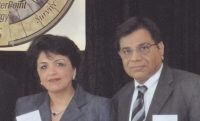Ashok Wadwani
Founder and President, Applied Field Data Systems

Ashok and Ishu Wadwani came to the U.S. in 1970 with two bags and $200. Today, the couple own and operate Applied Field Data Systems (AFDS), a company specializing in field-based GPS, GIS, and mapping services, consulting, and training.
After obtaining his master’s degree in physics from the University of Lucknow in 1963, Ashok landed his first jobs in marketing at the Indian partner offices of U.S. companies such as Perkin Elmer, Hewlett-Packard and Honeywell. After he and his wife got visas based on their educational backgrounds and obtained green cards, they relocated to Chicago, where Ashok was employed at Central Scientific, a company specializing in lab equipment. While working full-time, both Ashok and Ishu continued to attend school. After Ashok obtained his MBA from the Kellogg School of Management at Northwestern University, he moved among locations and jobs for several years, finally ending up in Houston. By 1984, he had started his own business designing handheld computers for the forestry industry – one of the forerunners of modern GPS.
Because GPS technology was still in its infancy in the mid-1980s, Ashok’s entrance into the field came by complete accident. “Early on, I had no clue what GPS even was,” he says. Provisions of the Clean Air Act moved him into the realm of fugitive emissions monitoring by 1986, when his company began supplying rugged handheld computers to refineries and petrochemical companies. His clients soon began requesting geospatial information for their emissions data points. “It was a customer-driven process,” he explains. “GPS technology was developed elsewhere, but AFDS developed the interface not only for petrochemical industries but others.” As the company grew, Ishu decided to join the business, giving up her lucrative job in the health care industry.
Ashok and Ishu stress that their success did not come easily. While they were able to find jobs quickly upon their arrival to the U.S., Ashok notes that the transition can pose a challenge to immigrants not accustomed to American culture. “Asian and European cultures are quite different from American culture, although Americans tend to regard all cultures as similar,” he observes.
In 27 years of running their own business, Ashok and Ishu take pride in the fact that they never had to fire a single employee and have remained debt-free. They strongly believe in encouraging and mentoring students and new graduates, and they continue to hire student interns and offer them flex time so they are able to attend classes. Perhaps most importantly, Ashok and Ishu look for people they can trust. Because running a small business means that often both of them are traveling and are frequently away from the office, they must be able to trust employees to get the job done under minimal supervision.
Small businesses operate with fewer financial resources than a large company, and the burden of accountability ultimately rests on the owners’ shoulders. However, there is also a great deal of personal freedom and flexibility. “You’re the boss – you make a commitment, and that’s it,” Ashok says. For anyone hoping to start his or her own business, he offers some advice: be open to working many hours, be prepared for failures and financial hardships, and be prepared to do odd jobs or “wear different hats” within the company. “We firmly believe there are skills we can teach,” say Ashok and Ishu, “but we can’t teach attitude.”